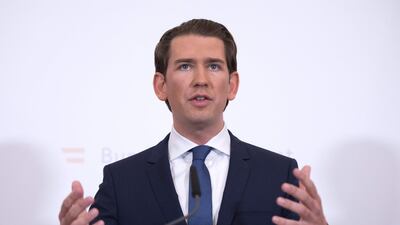Austria’s Chancellor Sebastian Kurz on Monday became the first chancellor in the country’s post-war history to be removed from office by a no-confidence vote over a corruption scandal that had already brought down his coalition with the far-right.
The motion against Mr Kurz and his cabinet is the latest fallout from the so-called “Ibiza-gate” scandal, in which far-right Freedom Party leader and Vice Chancellor Heinz-Christian Strache resigned from both posts.
Mr Strache was caught on film appearing to offer public contracts in return for campaign help from a fake Russian backer.
The video led to Mr Kurz, 32, ending his coalition with the Freedom Party and calling early elections for this year.
But that did not stop opposition parties tabling the no-confidence motion and insisting that the leader must also take responsibility for the scandal.
Despite Monday’s vote, Mr Kurz will take comfort in a big win for his conservative People’s Party in Sunday’s European elections.
The party is projected to gain 34.9 per cent of the vote and two extra European parliament seats.
Addressing cheering supporters on Monday evening, Mr Kurz denounced what he called the “new coalition” of the Freedom Party and the centre-left Social Democrats, who had joined forces in Parliament out of “hatred” for his party and voted for the motion.
Presenting himself as a figure of stability in Austria’s current turmoil, he said: “I’m still here, I’m standing for you.
“We can be sure that they will attack us but they can’t stop the change that we are putting in motion.”
Mr Kurz also pledged his support for the technocrat government now expected to be appointed by President Alexander Van der Bellen.
Mr Van der Bellen later appointed Finance Minister Hartwig Loeger to carry out the government’s duties in the meantime.
The no-confidence vote against Mr Kurz and his government took place in a special sitting of Parliament with more than half of MPs withdrawing their support, making him Austria’s shortest-serving chancellor.
Submitting the motion against Mr Kurz, the head of the Social Democrats, Pamela Rendi-Wagner, accused him of an unprecedented, “uncurbed and shameless power grab”.
The scandal erupted after the May 17 broadcast of hidden-camera recordings filmed in a luxury villa on the Spanish holiday island of Ibiza, a few months before Austria’s last parliamentary elections in 2017.
Apart from some embarrassing comments, Mr Strache appeared to allude to a scheme channelling political donations through foundations linked to his party to avoid legal scrutiny.
After Mr Strache’s resignation, Mr Kurz also sacked Freedom Party Interior Minister Herbert Kickl, saying he could not oversee any possible investigation into his own party’s wrongdoing.
Freedom Party ministers responded by walking out of the government en masse. Mr Kurz appointed experts to take their place in an interim government.
The Freedom Party, meanwhile, seemed to have suffered a setback in Sunday’s European parliamentary elections as a result of “Ibiza-gate”, falling from 19.7 per cent to 17.2 per cent and losing one of their four European Parliament seats.
But its leadership insisted that the share of votes shows they have a solid electoral base and that they could bounce back in time for the parliamentary elections.
When he became chancellor in late 2017, Mr Kurz was widely hailed on the European right as someone who could successfully tap into growing anti-immigration sentiment while projecting a polished demeanour.
But even before the crisis, the chancellor found himself constantly having to deny criticism for alleged extremist sympathies among Freedom Party members.
The opposition has blamed Mr Kurz for having invited the far-right into government in the first place, saying he had had ample warning against it.
Mr Kurz has admitted he found the Freedom Party’s antics “hard to swallow” but insisted he had no other choice.
“There was no other party which was ready to form a coalition with us,” he said on Thursday.

